Unit 12 You’re supposed to shake hands.>Section B>1-2c
文档属性
| 名称 | Unit 12 You’re supposed to shake hands.>Section B>1-2c | 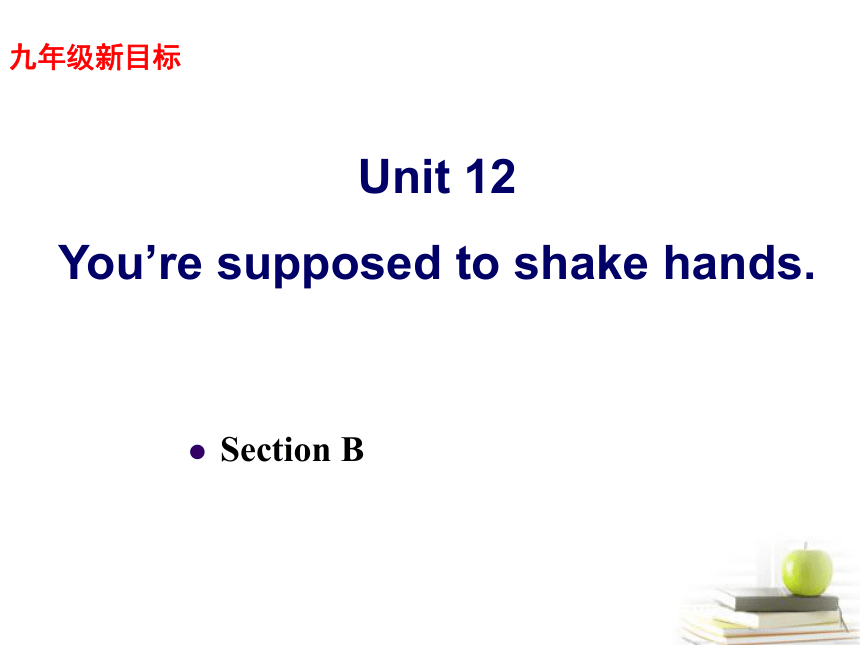 | |
| 格式 | zip | ||
| 文件大小 | 2.1MB | ||
| 资源类型 | 教案 | ||
| 版本资源 | 人教新目标(Go for it)版 | ||
| 科目 | 英语 | ||
| 更新时间 | 2013-02-19 12:06:59 | ||
图片预览

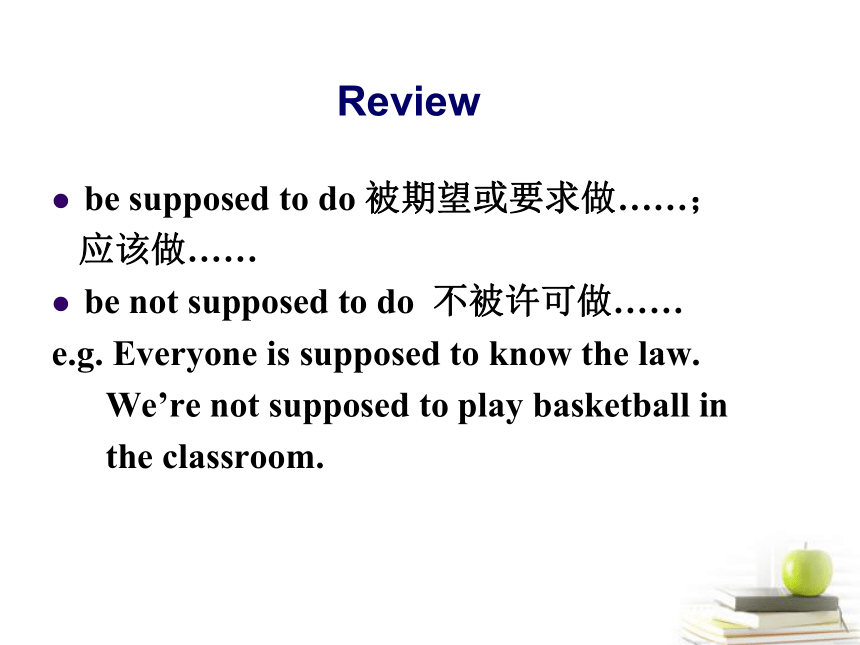
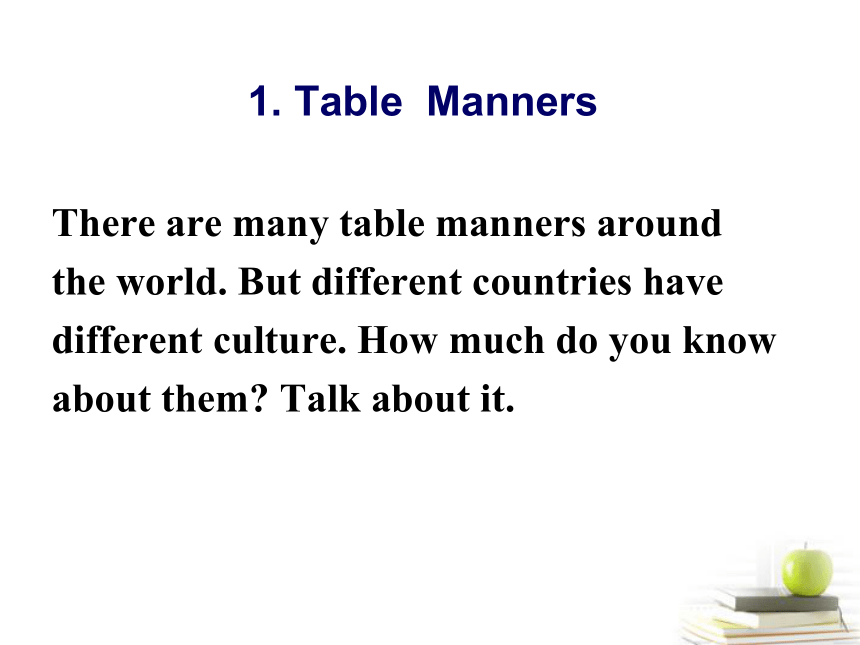
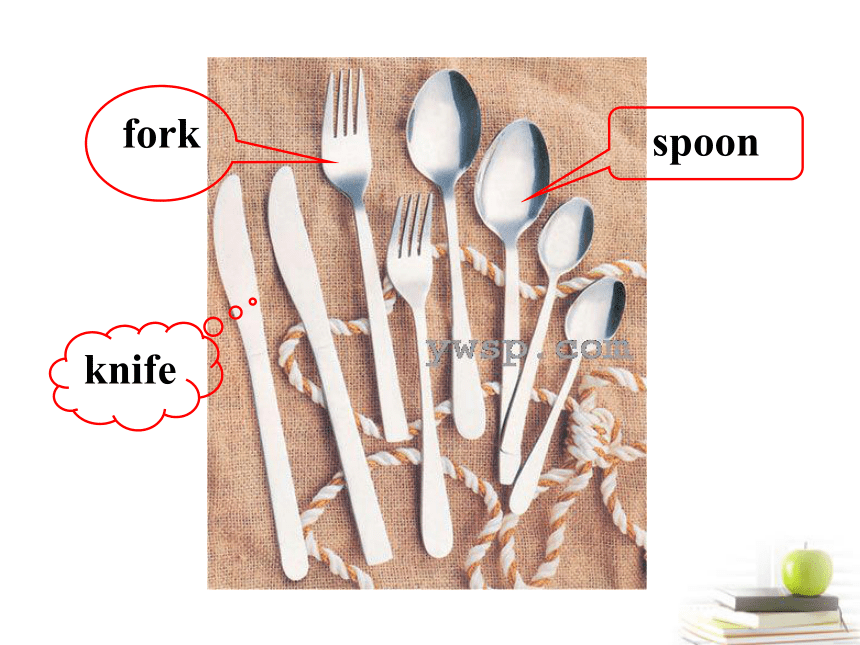
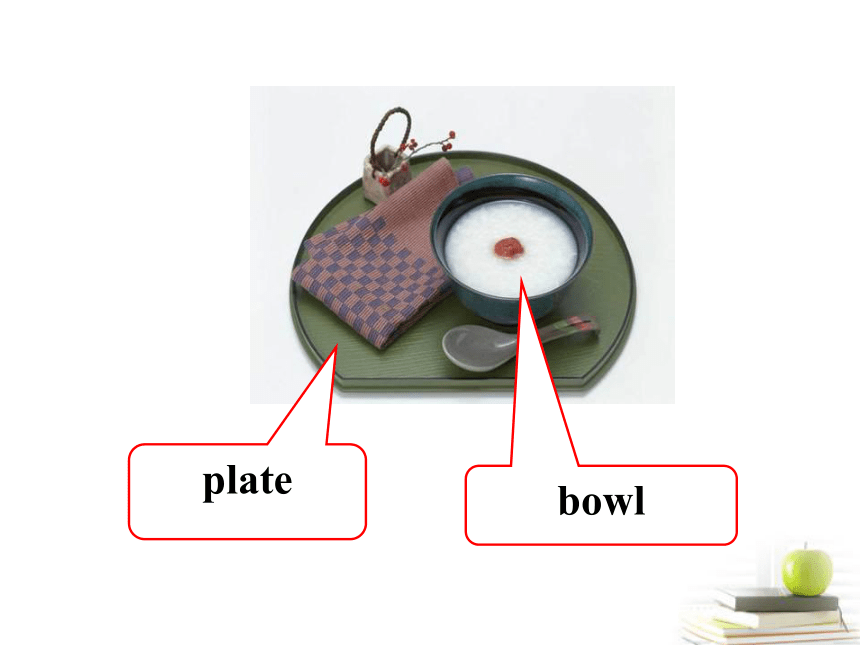
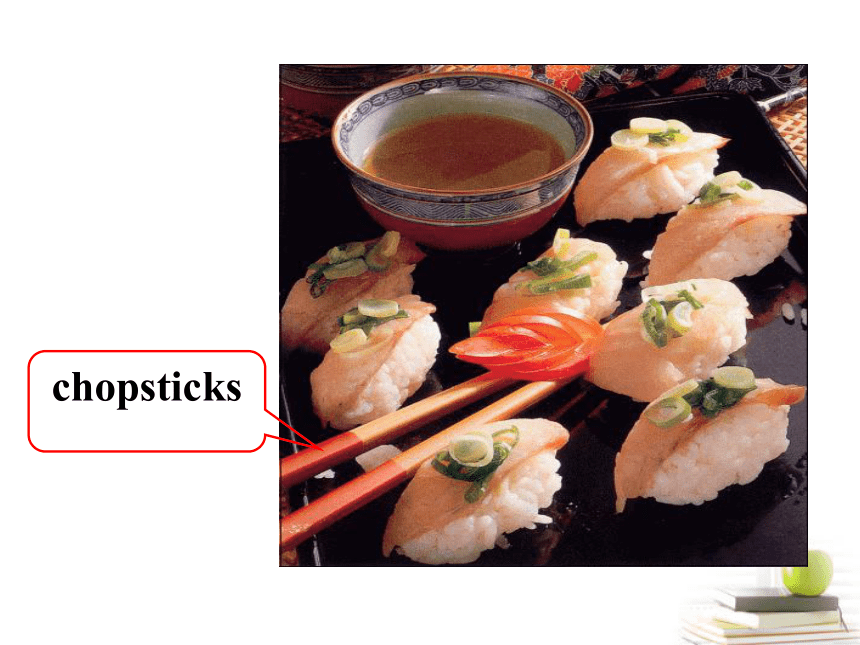
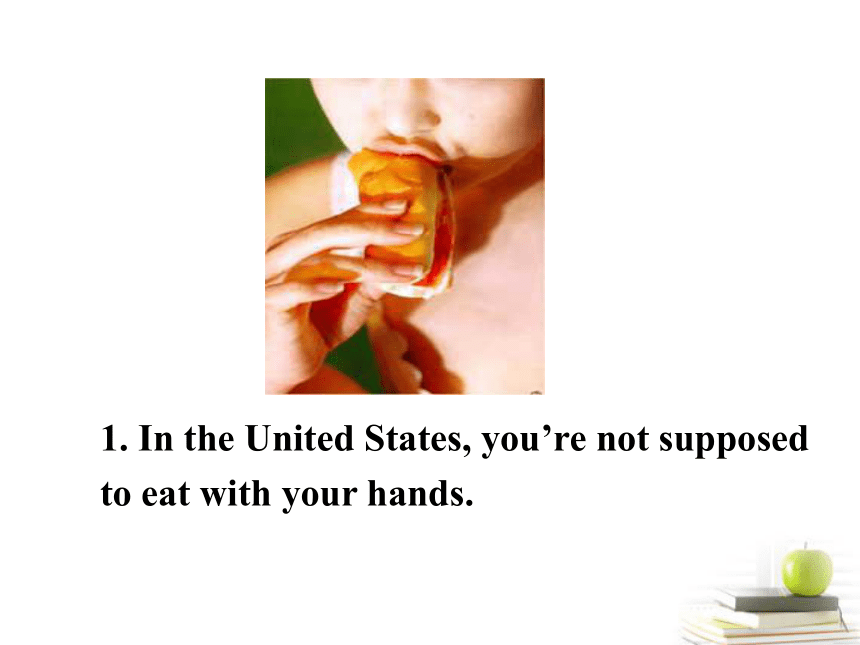
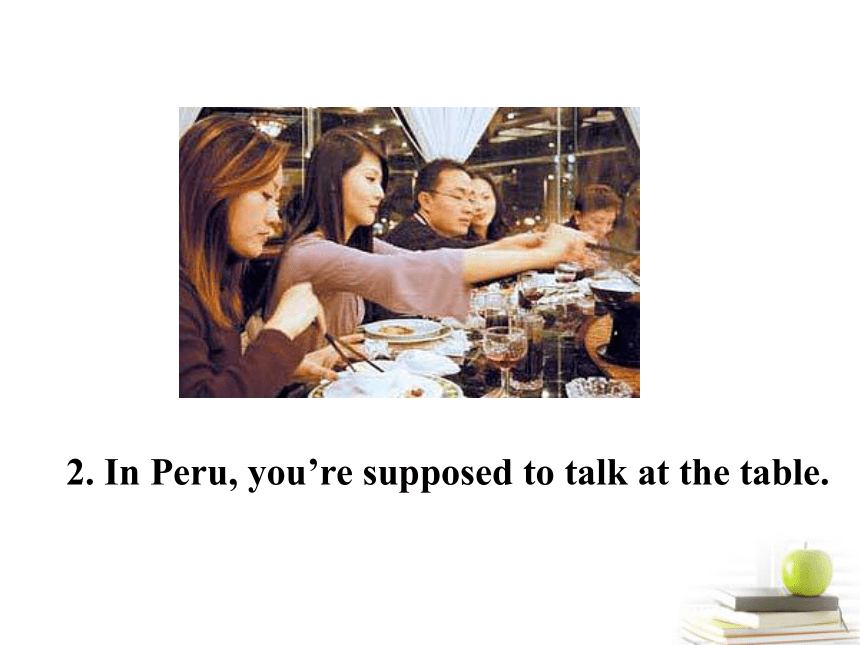
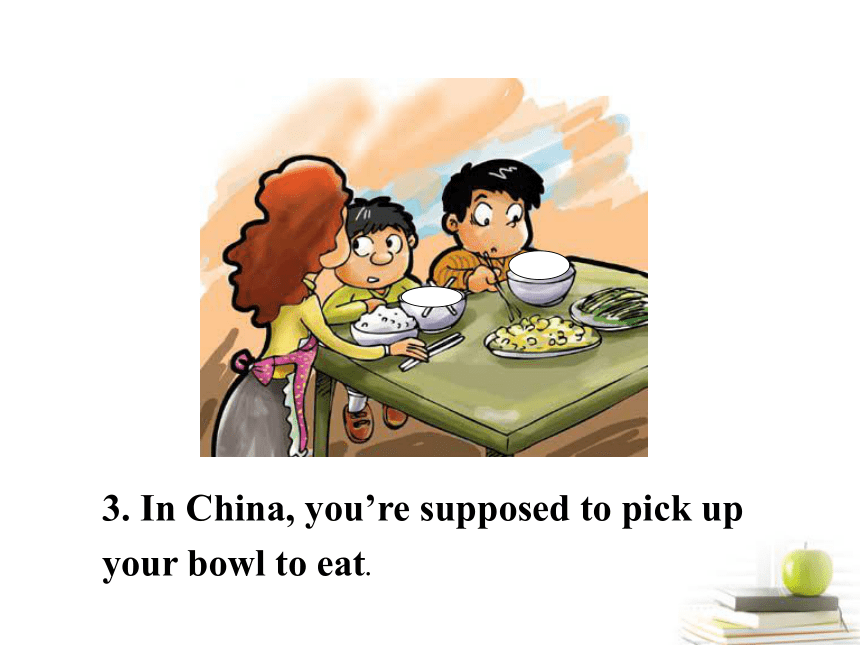
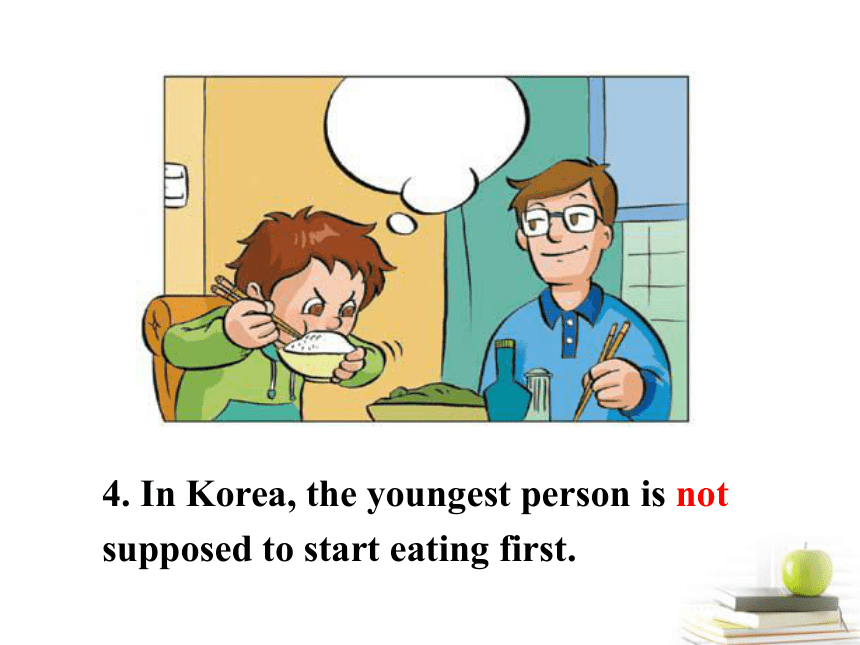
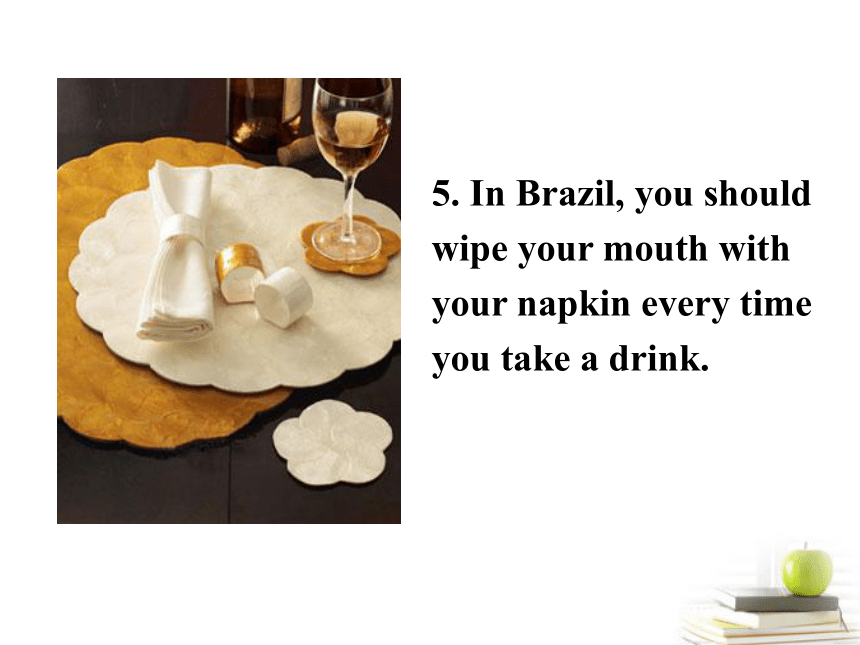
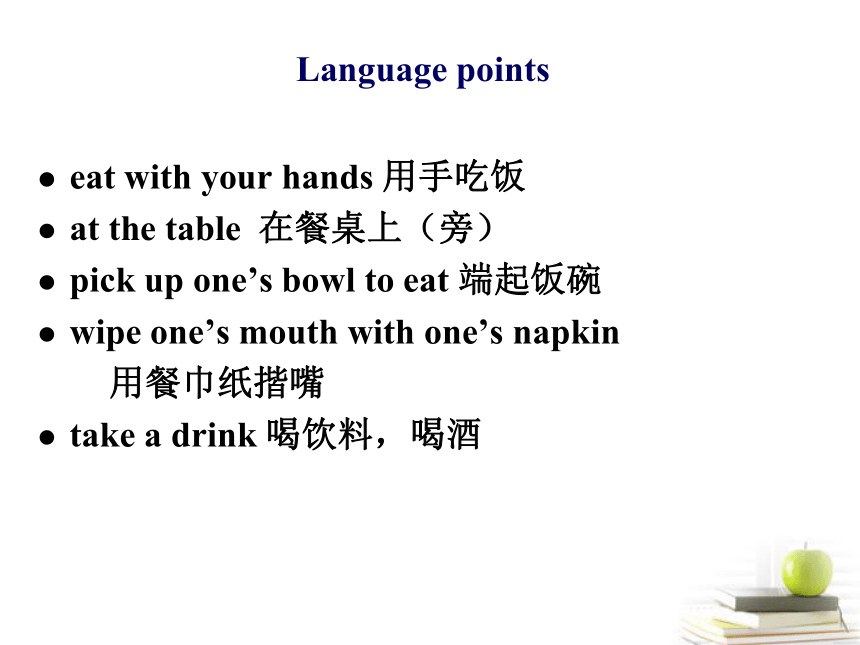
文档简介
(共41张PPT)
Section B
九年级新目标
Unit 12
You’re supposed to shake hands.
Review
be supposed to do 被期望或要求做……;
应该做……
be not supposed to do 不被许可做……
e.g. Everyone is supposed to know the law.
We’re not supposed to play basketball in
the classroom.
1. Table Manners
There are many table manners around
the world. But different countries have
different culture. How much do you know
about them Talk about it.
spoon
fork
knife
bowl
plate
chopsticks
1. In the United States, you’re not supposed
to eat with your hands.
2. In Peru, you’re supposed to talk at the table.
3. In China, you’re supposed to pick up
your bowl to eat.
4. In Korea, the youngest person is not
supposed to start eating first.
5. In Brazil, you should
wipe your mouth with
your napkin every time
you take a drink.
Language points
eat with your hands 用手吃饭
at the table 在餐桌上(旁)
pick up one’s bowl to eat 端起饭碗
wipe one’s mouth with one’s napkin
用餐巾纸揩嘴
take a drink 喝饮料,喝酒
2a. Tommorow steven is going to Jpan to be an exchange student. How much do you know the table manners in Japan
It is rude to stick the chopsticks in the bowl.
You aren’t supposed to eat or drink while
walking down the street.
You shouldn’t point at anyone with your
chopsticks.
You are supposed to make noise while
eating noodles.
2. Listen and number the pictures in the
order.
2
3
4
2b. Listen and learn! Match these sentence
parts.
__1.You aren’t
supposed…
__3.It’s rude to…
__4.It’s polite…
__5.You shouldn’t…
to make noise while eating
noodles.
to stick your chopsticks into
your food.
to point at anyone with your
chopsticks.
to eat or drink while walking
down the street.
d
a
b
d
Learn the conversation.
How much do you know about table manners
around the world In the United States, you are
not supposed to eat with your hands. In Japan,
you are not supposed to eat or drink while
walking down the street, and you are supposed
to make noise while eating noodles. It shows
that you like the food.
1
Learn the conversation.
In Korea, even the youngest person isn’t
supposed to start eating first. But in China,
you are supposed to pick up your bowl of rice.
Don't stick your chopsticks upright inthe rice
bowl. Instead, lay them on your dish. And
sometimes the Chinese host use their
chopsticks to put food in your bowl or plate.
This is a sign of politeness.
2
A: We’re supposed to …
B: Yes, and it’s rude/polite to …
2c. Pairwork!
Talk about the table manners in your country.
1. make noise while eating
2. point at others with chopstick
3. say hello to others
4. wipe your mouth after dinner
5. talk loudly at the table
Pairwork
6. kiss or shake hands
7. meet without saying anything
8. arrive too late
9. shake hands when you first meet someone
10. eat while walking in the street
Pairwork
3a. E-mail
Task 1: Read the e-mail message from Wang Kun and answer the questions.
1.Why was Wang Kun nervous before she arrived in France
2.Why did she have no reason to be nervous
Her French was not very good.
Her host family was really nice.
3. How has her French improved
4.What is one particular challenge she is facing
5.What does she find surprising
Her French has improved quickly, and she
is very comfortable speaking French now.
The people there put the bread on the tables
not on the plate.
One particular challenge is learning how to
behave at the dinner table.
Task 2: Make a list of table manners in France!
You aren’t supposed to … You are supposed to…
put your bread on your plate put your bread on the table
eat anything with your hands except bread(not even fruit) cut fruit up and eat it with a fork
say you are full say “it was delicious”
put your hands in your lap keep your hands on the table
4. Do in groups!
How can you help visitors to china Make a list of things
people are supposed to do in these different situtions.
eating meals with other people
making appointments
giving compliments
introducing other people
making a toast at dinner
offering tea
speaking to older people
Language points
1. In china ,you’re not supposed to pick up your
bowl of rice.
在中国,你不应该端起你的饭碗.
pick up, “捡起;拾起;拿起”。如:
A girl picked up a wallet on her way home.
The phone stopped ringing just as I picked up
the receiver.
Pick those things up off the floor!
2.In Brazil, you should wipe your mouth with
your napkin every time you take a drink.
在巴西,每次喝完东西后你应该用餐巾纸擦嘴.
wipe 动词,意思是 “擦,擦去”, 常与away, off,
up 连用,表示“擦干净’’。如:
Wipe the dirt off your shoes.
抹去鞋上的污泥.
Wipe up the milk you spilled, please.
请抹掉洒出来的牛奶.
3. to stick your chopsticks into your food.
把筷子插入你的食物中.
(1) stick 动词, “刺,插入”。如:
Stick a fork into the meat to see if it’s ready.
I can’t move. There’s a piece of wire sticking in
my leg.
(2) chopstick 是由 “chop(砍)+stick(棍子)组成的合成
词。意思是 “筷子”, 它通常以复数形式出现。如:
Our Chinese always use chopstick to eat, but
the English don’t use them.
一双筷子是a pair of chopsticks。
4. It’s rude to point at anyone with your chopsticks.
用你的筷子指着别人是很不礼貌的.
(1)rude 形容词,“粗鲁的;无理的”。常用词组
be rude to sb, 意思是 “对某人无理”, 如:
It’s rude to interrupt when people are speaking.
打断人家的话是不礼貌的.
I think it was rude of them not to phone and
say that they weren’t coming.
他们来不了,也不打电话通知一声,太不象话了.
(2) point 是一个动词,意思是 “指, 指向”。它构成的
词组”“point at”意思是 “指向” “对准”。如:
“I’ll have that one.” She said, pointing at a big
chocolate cake.
5. table manners 餐桌礼仪
(1) manner 是 “礼貌”的意思,常以复数形式出现。
e.g. It’s bad manner to talk with a full mouth.
(2) manner 还可以表示 “风俗;习惯”时,也常以复数
形式出现。如:
The manner of the ancient Egyptians
(3) manner 还可以表示 “方法;方式”,“态度;
举止”等意思。如:
Don’t you think that David has got a very
arrogant manner
Why are you talking in such a strange
manner
6. My biggest challenge is learning how to
behave at the dinner table.
我最大的挑战是学会餐桌上的礼仪。
behave 动词,意思是 “行为举止; 举止”如:
The boy behaved very well last night.
The teacher encouraged the children to
behave well and not to be a discredit to
the collective.
The little boy behaved with great encourage
in the face of gunman.
它还可以表示 “守规矩;举止适当有礼”。
e.g. Please behave yourself. 请礼貌点儿.
Will you children please behave!
它的相应的名词是behavior,意思是 “行为” 。
7. …but I’m gradually getting used to things…
词组 get/be used to 意思是 “习惯于……”,
词组中的to 是介词,其后如果跟动词, 动词
应该用动名词形式 。如:
The astronauts soon got used to the
condition of weightlessness.
I’m getting used to the cold weather.
She gets used to driving a small car.
He will get used to getting up early.
中考链接
( )1. —How nice the music sounds!
—It does! The peaceful music will make
you _____.
A. excited B. bored
C. moved D. relaxed
( )2. Class 2 will go for a picnic. They made
___ 6 o’clock to meet at the foot of Mt. Tai.
A. it B. that C. them D. /
A
D
( )3. —Could you tell me _______ tomorrow
morning
—Well, it will start at 9 o’clock.
A. when the film will start
B. where does the film start
C. when will the film start
D. where the film will start
( )4. —My aunt goes to climb Mount Gu every
Sunday.
—Oh But she ______ hate climbing mountains.
A. used to B. use to C. uses to D. is used to
A
A
( )5. China will spend about 52 billion yuan
____ a new airport and _____ the old one
in the west of China in the 11th FiveYear
Plan period.
A. repairing, building B. to build, repair
C. building, repairing D. to repair, build
C
Homework
1. Write an e-mail message to a friend about
the table manners in Japan.
2. Write an e-mail message telling someone
from another country about the table
manners in you country.
Section B
九年级新目标
Unit 12
You’re supposed to shake hands.
Review
be supposed to do 被期望或要求做……;
应该做……
be not supposed to do 不被许可做……
e.g. Everyone is supposed to know the law.
We’re not supposed to play basketball in
the classroom.
1. Table Manners
There are many table manners around
the world. But different countries have
different culture. How much do you know
about them Talk about it.
spoon
fork
knife
bowl
plate
chopsticks
1. In the United States, you’re not supposed
to eat with your hands.
2. In Peru, you’re supposed to talk at the table.
3. In China, you’re supposed to pick up
your bowl to eat.
4. In Korea, the youngest person is not
supposed to start eating first.
5. In Brazil, you should
wipe your mouth with
your napkin every time
you take a drink.
Language points
eat with your hands 用手吃饭
at the table 在餐桌上(旁)
pick up one’s bowl to eat 端起饭碗
wipe one’s mouth with one’s napkin
用餐巾纸揩嘴
take a drink 喝饮料,喝酒
2a. Tommorow steven is going to Jpan to be an exchange student. How much do you know the table manners in Japan
It is rude to stick the chopsticks in the bowl.
You aren’t supposed to eat or drink while
walking down the street.
You shouldn’t point at anyone with your
chopsticks.
You are supposed to make noise while
eating noodles.
2. Listen and number the pictures in the
order.
2
3
4
2b. Listen and learn! Match these sentence
parts.
__1.You aren’t
supposed…
__3.It’s rude to…
__4.It’s polite…
__5.You shouldn’t…
to make noise while eating
noodles.
to stick your chopsticks into
your food.
to point at anyone with your
chopsticks.
to eat or drink while walking
down the street.
d
a
b
d
Learn the conversation.
How much do you know about table manners
around the world In the United States, you are
not supposed to eat with your hands. In Japan,
you are not supposed to eat or drink while
walking down the street, and you are supposed
to make noise while eating noodles. It shows
that you like the food.
1
Learn the conversation.
In Korea, even the youngest person isn’t
supposed to start eating first. But in China,
you are supposed to pick up your bowl of rice.
Don't stick your chopsticks upright inthe rice
bowl. Instead, lay them on your dish. And
sometimes the Chinese host use their
chopsticks to put food in your bowl or plate.
This is a sign of politeness.
2
A: We’re supposed to …
B: Yes, and it’s rude/polite to …
2c. Pairwork!
Talk about the table manners in your country.
1. make noise while eating
2. point at others with chopstick
3. say hello to others
4. wipe your mouth after dinner
5. talk loudly at the table
Pairwork
6. kiss or shake hands
7. meet without saying anything
8. arrive too late
9. shake hands when you first meet someone
10. eat while walking in the street
Pairwork
3a. E-mail
Task 1: Read the e-mail message from Wang Kun and answer the questions.
1.Why was Wang Kun nervous before she arrived in France
2.Why did she have no reason to be nervous
Her French was not very good.
Her host family was really nice.
3. How has her French improved
4.What is one particular challenge she is facing
5.What does she find surprising
Her French has improved quickly, and she
is very comfortable speaking French now.
The people there put the bread on the tables
not on the plate.
One particular challenge is learning how to
behave at the dinner table.
Task 2: Make a list of table manners in France!
You aren’t supposed to … You are supposed to…
put your bread on your plate put your bread on the table
eat anything with your hands except bread(not even fruit) cut fruit up and eat it with a fork
say you are full say “it was delicious”
put your hands in your lap keep your hands on the table
4. Do in groups!
How can you help visitors to china Make a list of things
people are supposed to do in these different situtions.
eating meals with other people
making appointments
giving compliments
introducing other people
making a toast at dinner
offering tea
speaking to older people
Language points
1. In china ,you’re not supposed to pick up your
bowl of rice.
在中国,你不应该端起你的饭碗.
pick up, “捡起;拾起;拿起”。如:
A girl picked up a wallet on her way home.
The phone stopped ringing just as I picked up
the receiver.
Pick those things up off the floor!
2.In Brazil, you should wipe your mouth with
your napkin every time you take a drink.
在巴西,每次喝完东西后你应该用餐巾纸擦嘴.
wipe 动词,意思是 “擦,擦去”, 常与away, off,
up 连用,表示“擦干净’’。如:
Wipe the dirt off your shoes.
抹去鞋上的污泥.
Wipe up the milk you spilled, please.
请抹掉洒出来的牛奶.
3. to stick your chopsticks into your food.
把筷子插入你的食物中.
(1) stick 动词, “刺,插入”。如:
Stick a fork into the meat to see if it’s ready.
I can’t move. There’s a piece of wire sticking in
my leg.
(2) chopstick 是由 “chop(砍)+stick(棍子)组成的合成
词。意思是 “筷子”, 它通常以复数形式出现。如:
Our Chinese always use chopstick to eat, but
the English don’t use them.
一双筷子是a pair of chopsticks。
4. It’s rude to point at anyone with your chopsticks.
用你的筷子指着别人是很不礼貌的.
(1)rude 形容词,“粗鲁的;无理的”。常用词组
be rude to sb, 意思是 “对某人无理”, 如:
It’s rude to interrupt when people are speaking.
打断人家的话是不礼貌的.
I think it was rude of them not to phone and
say that they weren’t coming.
他们来不了,也不打电话通知一声,太不象话了.
(2) point 是一个动词,意思是 “指, 指向”。它构成的
词组”“point at”意思是 “指向” “对准”。如:
“I’ll have that one.” She said, pointing at a big
chocolate cake.
5. table manners 餐桌礼仪
(1) manner 是 “礼貌”的意思,常以复数形式出现。
e.g. It’s bad manner to talk with a full mouth.
(2) manner 还可以表示 “风俗;习惯”时,也常以复数
形式出现。如:
The manner of the ancient Egyptians
(3) manner 还可以表示 “方法;方式”,“态度;
举止”等意思。如:
Don’t you think that David has got a very
arrogant manner
Why are you talking in such a strange
manner
6. My biggest challenge is learning how to
behave at the dinner table.
我最大的挑战是学会餐桌上的礼仪。
behave 动词,意思是 “行为举止; 举止”如:
The boy behaved very well last night.
The teacher encouraged the children to
behave well and not to be a discredit to
the collective.
The little boy behaved with great encourage
in the face of gunman.
它还可以表示 “守规矩;举止适当有礼”。
e.g. Please behave yourself. 请礼貌点儿.
Will you children please behave!
它的相应的名词是behavior,意思是 “行为” 。
7. …but I’m gradually getting used to things…
词组 get/be used to 意思是 “习惯于……”,
词组中的to 是介词,其后如果跟动词, 动词
应该用动名词形式 。如:
The astronauts soon got used to the
condition of weightlessness.
I’m getting used to the cold weather.
She gets used to driving a small car.
He will get used to getting up early.
中考链接
( )1. —How nice the music sounds!
—It does! The peaceful music will make
you _____.
A. excited B. bored
C. moved D. relaxed
( )2. Class 2 will go for a picnic. They made
___ 6 o’clock to meet at the foot of Mt. Tai.
A. it B. that C. them D. /
A
D
( )3. —Could you tell me _______ tomorrow
morning
—Well, it will start at 9 o’clock.
A. when the film will start
B. where does the film start
C. when will the film start
D. where the film will start
( )4. —My aunt goes to climb Mount Gu every
Sunday.
—Oh But she ______ hate climbing mountains.
A. used to B. use to C. uses to D. is used to
A
A
( )5. China will spend about 52 billion yuan
____ a new airport and _____ the old one
in the west of China in the 11th FiveYear
Plan period.
A. repairing, building B. to build, repair
C. building, repairing D. to repair, build
C
Homework
1. Write an e-mail message to a friend about
the table manners in Japan.
2. Write an e-mail message telling someone
from another country about the table
manners in you country.
同课章节目录
- Unit 1 How can we become good learners.
- Section A
- Section B
- Unit 2 I think that mooncakes are delicious!
- Section A
- Section B
- Unit 3 Could you please tell me where the restroom
- Section A
- Section B
- Unit 4 I used to be afraid of the dark.
- Section A
- Section B
- Unit 5 What are the shirts made of?
- Section A
- Section B
- Review of Units 1-5
- Unit 6 When was it invented?
- Section A
- Section B
- Unit 7 Teenagers should be allowed to choose their
- Section A
- Section B
- Unit 8 It must belong to Carla.
- Section A
- Section B
- Unit 9 I like music that I can dance to.
- Section A
- Section B
- Unit 10 You're supposed to shake hands.
- Section A
- Section B
- Review of Units 6-10
- Unit 11 Sad movies make me cry.
- Section A
- Section B
- Unit 12 Life is full of the unexpected
- Section A
- Section B
- Unit 13 We're trying to save the earth!
- Section A
- Section B
- Unit 14 I remember meeting all of you in Grade 7.
- Section A
- Section B
- Review of Units 11-14
